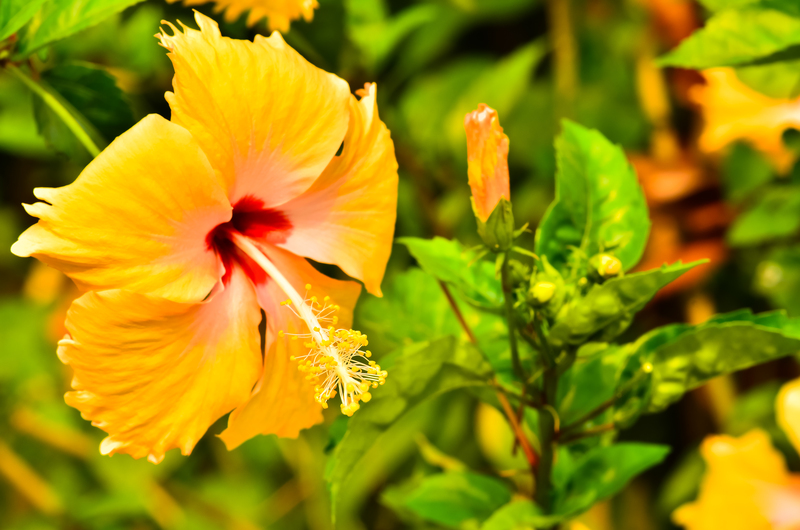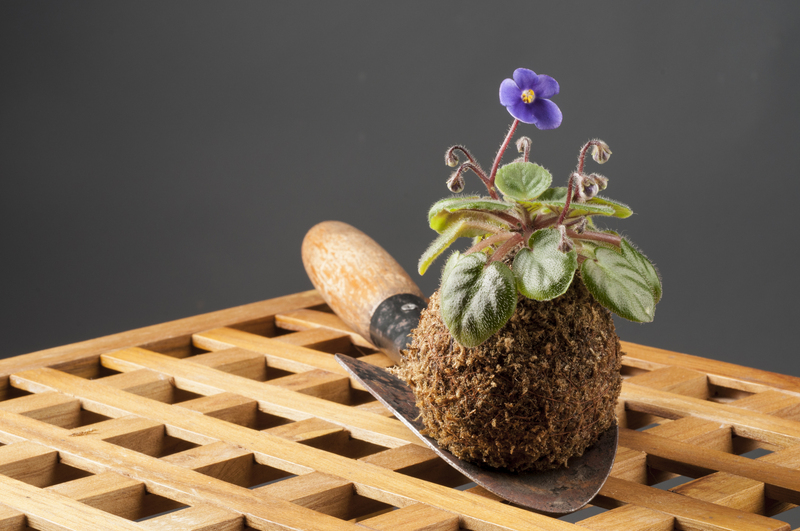Elevate Your Orchid Care Skills Today
Posted on 24/08/2025
Elevate Your Orchid Care Skills Today: The Ultimate Guide
Are you ready to elevate your orchid care skills and transform your home into an exotic paradise? Whether you are a beginner or have a thriving collection, mastering orchid care requires knowledge, patience, and the right techniques. In this comprehensive and SEO-optimized guide, we will reveal the secrets to growing stunningly healthy orchids, address common pitfalls, and share expert tips so you can enjoy months of mesmerizing blooms.

Understanding Orchids: A Fascinating Family of Plants
Orchids, belonging to the Orchidaceae family, are among the most diverse and widespread flowers globally. Their remarkable adaptability allows them to flourish in various climates - from tropical rainforests to arid deserts. To enhance your orchid care skills today, it's crucial to understand their natural habitat, growth patterns, and unique requirements.
Why Orchids Are Special
- Unmatched Variety: Over 25,000 species and 100,000 hybrids to explore
- Exquisite Blooms: Spectacular flowers in every color, shape, and size
- Long-Lasting Beauty: Some species bloom for several weeks or even months
- Air Purifiers: Orchids can improve your indoor air quality
Creating the Perfect Orchid Environment
The first step to leveling up your orchid caretaking is mimicking their native environment. Light, humidity, temperature, and air circulation are key elements that can make or break your orchids' well-being.
Lighting: Providing the Ideal Amount
- Bright, Indirect Light: Most orchids, like Phalaenopsis, thrive in bright but filtered sunlight. Avoid direct sun that can scorch leaves.
- South or East-Facing Windows: These locations are perfect for gentle morning rays and reduced heat in the afternoon.
- Grow Lights: In low-light homes, invest in LED grow lights to sustain healthy growth year-round.
Humidity: Boosting Moisture the Right Way
- Optimal Range: Most orchids prefer humidity levels between 40% and 70%.
- Humidifiers or Trays: Use a humidity tray or room humidifier in dry climates or heated homes, especially in winter.
- Misting: Mist leaves occasionally--but avoid excessive moisture on blooms to prevent disease.
Temperature: Maintaining Orchid-Friendly Conditions
- Day-Night Fluctuations: Most orchids (especially Phalaenopsis and Cattleya) enjoy 65-80?F (18-27?C) during the day and a 10?F (5?C) drop at night.
- Consistent Regimes: Avoid extremes or sudden temperature changes.
Air Circulation: The Underrated Necessity
Good air movement prevents mold and fungal problems. Use small fans on a low setting, especially if your orchid collection is large. Just make sure air doesn't blow directly onto the flowers, which can cause dehydration.
Essential Orchid Care Techniques to Master
To truly elevate your orchid care abilities, get hands-on with these fundamental yet often misunderstood steps:
Watering Orchids: How and When
- Less Is More: Overwatering is the top reason for orchid failure. Most orchids need water once a week (twice in warm, dry periods).
- Soak and Drain: Water thoroughly until it runs out the bottom--never let roots sit in water.
- Check the Roots: Silvery roots signal dryness; green roots mean they're sufficiently moist.
Repotting: Give Roots Room to Breathe
- When to Repot: Every 1-2 years or when the media breaks down or roots overflow the pot.
- Choosing Pot and Media: Clear plastic pots let you monitor roots; bark or sphagnum moss is ideal for most orchids.
- Aftercare: Water lightly after repotting and gradually resume regular care routines.
Feeding Your Orchids: Fertilizer Facts
- Balanced Orchid Fertilizer: Use a 20-20-20, diluted to quarter-strength, every 2-4 weeks during active growth.
- Flush the Roots: Every few months, flush pots with clean water to prevent salt buildup.
- Rest Periods Matter: Some orchids need a winter rest--reduce feeding and watering when not in active growth.
Spotting and Solving Common Orchid Problems
Raising your orchid cultivation expertise means recognizing signs of trouble early and knowing exactly how to respond. Below are the most frequent issues that can hinder your progress:
Yellowing Leaves
- Causes: Overwatering, poor drainage, insufficient light, or natural leaf aging.
- Solution: Check roots for rot, review your watering routine, and relocate for better light.
No Blooms
- Causes: Not enough light, inadequate feeding, lack of temperature fluctuation, or old age.
- Solution: Increase light exposure, ensure a cool nighttime drop, feed regularly, and be patient.
Pest Infestation
- Common Culprits: Aphids, scale, spider mites, and mealybugs.
- Solution: Rinse with water, remove pests with cotton swabs dipped in rubbing alcohol, and use neem oil or insecticidal soap if necessary.
Root Rot
- Symptoms: Mushy, brown or black roots; moldy smell.
- Solution: Repot in fresh media, trim off all rotten roots, reduce watering frequency.
Boost Your Skills: Advanced Tips for Orchid Enthusiasts
Once you've nailed the basics, it's time to level up your orchid care skills with more advanced techniques. These practices are favored by experts for cultivating exceptional, competition-worthy orchids.
Propagation: Creating New Orchids
- Division: Suitable for mature Cattleya, Dendrobium, and sympodial orchids. Simply split the plant into clumps during repotting.
- Keiki Growth: Many Phalaenopsis develop baby plants called keikis. Once they develop roots, they can be potted separately.
Orchid Training and Mounting
- Staking: Gently stake flower spikes to encourage upright and tidy growth.
- Mounting: Affix orchids to cork bark or tree branches for a stunning, naturalistic display--just mist frequently to compensate for faster drying.
Bloom Boosting Secrets
- Seasonal Temperature Drops: For species like Phalaenopsis, a few weeks of cool nights (55?F/13?C) can trigger flower spikes.
- Proper Rest Periods: Research your specific orchid's rest needs to avoid failed or delayed blooms.
Using the Right Water
- Rainwater or Distilled Water: Pure water prevents salt and mineral buildup. Tap water is acceptable only if it's low in salts and chlorine.
- Acclimating to Your Water: Observe your plant's response and adjust your watering schedule as necessary.
Orchid Care Throughout the Seasons
Keeping your orchids vibrant around the year means adapting to changing seasons. Here's how to refine your orchid care skillset as the months pass:
Spring & Summer
- Growth Surge: Orchids grow actively--fertilize and water more frequently while ensuring good light.
- Watch for Heat: Shield from direct midday sun and boost humidity during hot spells.
Fall
- Prepare for Dormancy: Many orchids slow down, requiring less water and fertilizer.
- Initiate Bloom Triggers: Adjust temperature and light to stimulate flower spike growth.
Winter
- Adjust Watering: Reduce frequency as growth slows--but never allow roots to dry out completely.
- Humidity Is Critical: Run humidifiers as indoor heating dries air rapidly.
Curating Your Orchid Collection: Popular Varieties to Try
As you improve your orchid growing expertise, you may wish to diversify your collection. Here are some top varieties to try and their specific needs:
- Phalaenopsis (Moth Orchid): Ideal beginner's choice with long-lasting blooms and adaptability to indoor conditions.
- Cattleya: Known for large, fragrant flowers and requires bright light.
- Dendrobium: Offers upright canes and prolific blooming; prefers strong light and less water during dormancy.
- Oncidium (Dancing Lady): Produces cascades of small flowers; needs excellent air movement and frequent watering while growing.
- Paphiopedilum (Lady's Slipper): Loves moderate light and constant moisture but never soggy soil.
Myths and Mistakes: What NOT to Do When Caring for Orchids
To elevate your orchid care skills, it's vital to distinguish fact from fiction. Here are common misconceptions and errors to avoid:
- Ice Cubes for Watering: Orchids prefer even, tepid soakings. Ice cubes can shock roots and are insufficient for thorough hydration.
- Ignoring Repotting: Dead or decomposed potting media suffocates roots. Regular repotting is essential for ongoing health.
- Direct Sunlight Exposure: While orchids need plenty of light, direct midday sun can quickly burn their leaves.
- Using Garden Soil: Orchids require open, airy media. Never use regular potting soil for repotting.
- Overfeeding: Too much fertilizer can harm roots--less is more!

Resources and Community: Continue Your Orchid Education
Part of elevating your orchid care skills is joining a wider community of enthusiasts and experts. Consider these steps:
- Join Local Orchid Societies: Attend meetings and shows to learn from experienced growers.
- Online Forums & Social Media: Platforms such as Reddit, Facebook, and Instagram host passionate orchid groups.
- Take Workshops: Many botanical gardens and nurseries offer care classes.
- Read Trusted Sources: Books, research articles, and university extension guides are invaluable for detailed learning.
Conclusion: Take Action and Cultivate Success
If you dream of displaying a lush, flourishing orchid collection, the path forward is in your hands. By following these advanced orchid care tips and avoiding common mistakes, you'll be empowered to elevate your orchid care skills today. With each new leaf and spectacular bloom, your confidence will blossom, too. So why wait? Start implementing these strategies and enjoy the rewarding journey of nurturing the world's most enchanting flowers.
Tags: Elevate Your Orchid Care Skills Today, orchid care guide, growing orchids, home orchid tips, plant care.
```Latest Posts
Top Gardening Tools to Elevate Your Outdoor Experience
Kickstart Your Neglected Garden Makeover Journey
Transform Your Space with a Beautiful Herb Garden
Start Your Green Adventure: 9 Essential Gardening Tips for Beginners
Transform Your Yard into Serene Zen Spaces for Ultimate Relaxation and Calm

